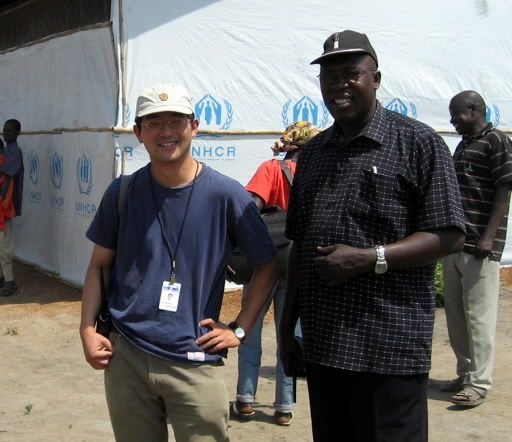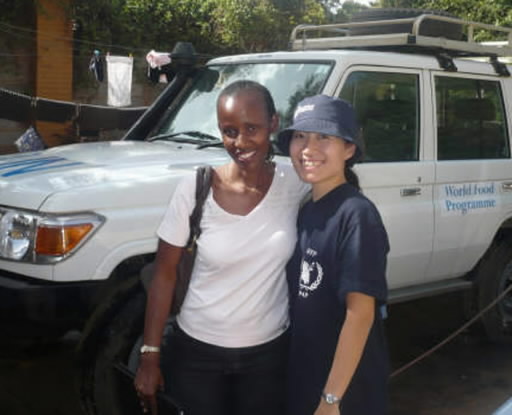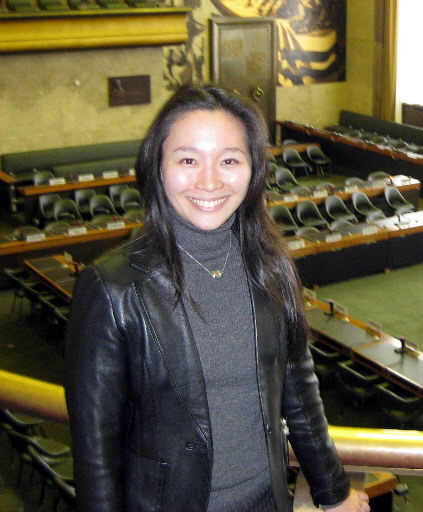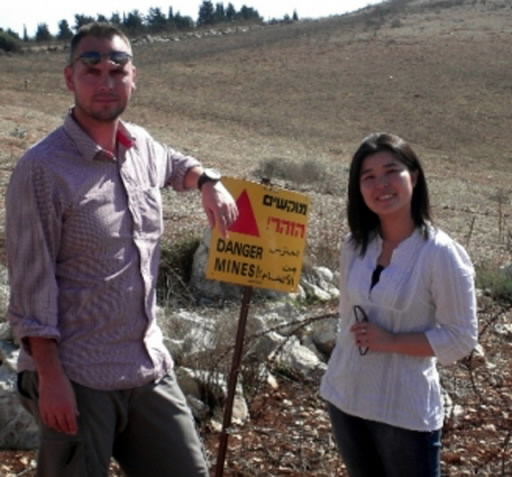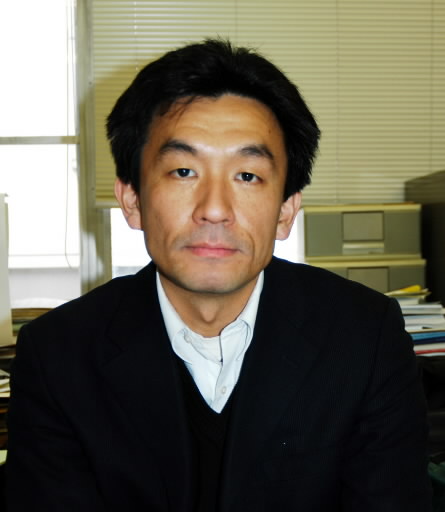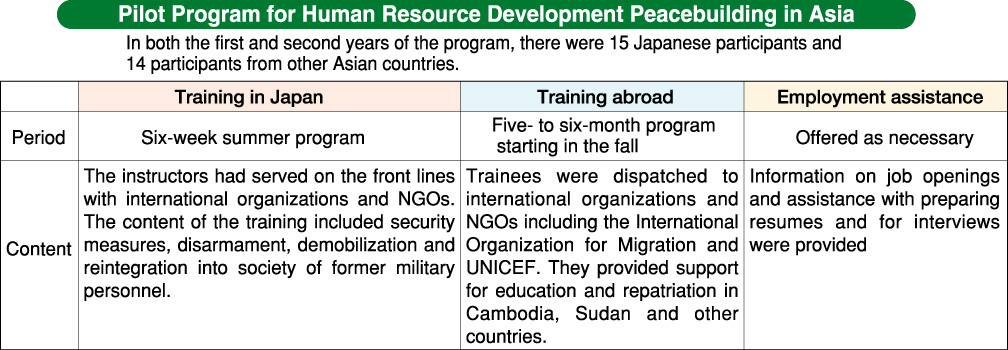Hiroshima Peacebuilders Center training program shows good results
Apr. 12, 2009
by Kensuke Murashima, Staff Writer
The Pilot Program for Human Resource Development in Asia of Hiroshima University’s Hiroshima Peacebuilders Center has shown good results in its first two years. Conducted under the auspices of the Foreign Ministry, the program trained personnel to provide support for the reconstruction of regions torn by conflict. Some of its graduates have gone on to work for United Nations agencies. A total of 58 trainees from Japan and other Asian countries participated in the program. Some had worked in private business while others had experience in international organizations. Participants said that through the program’s practical curriculum they gained a sense of mission for the support of reconstruction as well as ideas about how to build peace. The Foreign Ministry has concluded the two-year pilot program and is launching a full-scale program this fiscal year with nearly twice the budget.
58 participants active in UN as well as conflict regions
The assistance of civilians in peacebuilding is essential in many areas including the repatriation of refugees, conducting elections, and education. But Japan has thus far played only a minor role.
According to the Foreign Ministry, as of February 2007, about 6,500 civilians were involved in UN peacekeeping activities around the world. Of these, only 23, 0.35 percent, were Japanese. Hideaki Shinoda, an associate professor at Hiroshima University who served as director of the pilot program, said, “Until now, the training of civilian experts was carried out by individual organizations.” So in Japan, little effort had been made to create mechanisms to support peacebuilding and reconstruction in war-torn regions.
In light of that, the trainees who participated in the pilot program included not only those who had experience in the field but also many “novices” who had previously worked for private companies but wanted to go to work for international organizations. Among their reasons for participating in the program, they cited the opportunity to gain field experience, which is essential when working for an international organization, and a desire to get a job in the peacebuilding field.
After completing the one-year program, which focused on practical training, many of the trainees said they benefited greatly from meeting people with whom they could share their problems and concerns. The program’s effort to develop human resources in an organized way based on a systematic curriculum is highly significant.
Some of the graduates of the program’s first two years have gone on to work in the offices of United Nations agencies including the Office of the United Nations High Commissioner for Refugees (UNHCR) and the United Nations Children’s Fund (UNICEF). Others are now working in such places as Kosovo, Sudan, and East Timor.
As a result of the program’s success, the Foreign Ministry increased the annual budget for the program from 180 million to 320 million. In addition, a program was also created to dispatch former civil servants and civilian experts ranging in age from 40 to 69 overseas. Another new program sponsors peacebuilding seminars for current civil servants and the employees of related agencies.
Tatsuhiko Furumoto, 32, first year trainee: Gains experience through repatriation effort
Before joining the program, Tatsuhiko Furumoto worked as a reporter for Kyodo News in Matsue and other areas and believed that monitoring authority and reporting on elections were part of peacebuilding. But he decided he wanted to have a job in which he could help people directly, so he joined the peacebuilding program. He said he gained both experience and connections as a result.
Mr. Furumoto worked on a UNHCR repatriation project in Sudan. Recalling his time there, he said, “I learned all sorts of things you can’t learn in a classroom, such as what precautions to take when dealing with people in a situation where you don’t know when you might find yourself in danger. I also learned how to coordinate the efforts of support organizations to make their support more effective.”
Most people work for UN agencies under contracts of two years or less. “People must have experience in the field, otherwise they can’t get hired,” Mr. Furumoto said. He said it was essential to continually make an effort to find work by getting advice from experienced people in the field and by making use of connections. Mr. Furumoto now works for the UN Development Program in Nepal.
Haruka Katarao, 26, first year trainee: Determination to get stalled disarmament moving
Haruka Katarao, whose experiences included sitting in on a review conference for the Nuclear Non-proliferation Treaty, participated in the program in the belief that “moving forward with peacebuilding will create the foundation for disarmament.”
Born in Hiroshima, Ms. Katarao attended the 2005 NPT review conference as a member of a local peace organization. The following year she attended the UN Small Arms Review Conference while an intern at the UN Office for Disarmament Affairs. Little progress was made at either meeting.
Ms. Katarao said the lack of progress in the disarmament negotiations helped her recognize the need to first build peace. During her training she heard about the experiences of other trainees from Asian countries where conflicts are going on. “It was very satisfying. I felt as if I’d gone back to school,” she said. She keeps in touch with her fellow trainees via e-mail.
Ms. Katarao now works as a resident researcher for the Japanese government at the Organisation for the Prohibition of Chemical Weapons in The Hague.
Yumiko Yoshioka, 33, second year trainee: Learning from the ideas of others
From 2001 through 2008, Yumiko Yoshioka worked in the Japanese embassy in Israel and in the Jordan office of the Japan International Cooperation Agency gathering information on the Middle East and assisting in reconstruction efforts.
She was concerned that she would lose a balanced perspective while working in peacebuilding efforts focused only on the Middle East. She applied for the training program because, “I wanted to learn from the experiences of others with more varied backgrounds,” she said.
Ms. Yoshioka said conversations with other trainees, including those from Asia, were fruitful. “I realized once again that when problems occur, in Asia we place top priority on solving them, but in the Middle East and Africa they emphasize their own interests, so it takes longer to solve problems,” she said. She also mentioned the great value of listening to the other trainees speak about their experiences, which enabled her to gain “vicarious experiences” of her own.
Originally from Hofu in Yamaguchi Prefecture, Ms. Yoshioka now works as an administrator in the Foreign Ministry.
Yoko Fukushima, 31, second year trainee: Sensing hopes while supplying food
Yoko Fukushima hopes to use the experience she gained in a private company to provide support for reconstruction.
After traveling to India, she became interested in the problem of poverty. At the same time, she felt that support activities meant more than just going to the front lines. “I wanted to participate in support activities to the best of my ability. Providing support after building infrastructure and establishing an educational system are also important,” she said.
At the company where she worked after graduating from university, Ms. Fukushima was involved in hiring personnel needed to set up the information technology system. Since then she has felt that this area would be useful in future support activities.
Ms. Fukushima was a trainee in the UN’s World Food Programme in Kenya, involved in procuring from small farmers food supplies needed for aid. She sensed keenly the hope in the eyes of the children who gathered around their vehicles bearing the UN logo. She would like to continue working with the WFP.
Hideaki Shinoda, director of the Hiroshima Peacebuilders Center: Emphasis on developing connections
Many people in Japan don’t have a clear idea of what peacebuilding means. One of the project’s goals was to have its work recognized by the public and to enhance the public’s knowledge.
That is also part of the reason why we selected trainees who had worked in private businesses as well as those with experience in the peacebuilding field. I feel that if people with various skills consider the field of peacebuilding as an area in which they would like to work, it would open up more possibilities. I believe the achievements of the program’s trainees in their jobs will help bring wider recognition to the field of peacebuilding.
In order to make the training meaningful and produce results, some aspects of the program were changed in the second year. Because it takes time to understand the situation in a country, overseas training was lengthened. Creating a network with those who were already in the field was another important issue. In the program’s second year, employees of overseas human resources development agencies were invited to attend a workshop.
Hiroshima recovered from the devastation of the atomic bombing. Trainees who studied peacebuilding here can offer hope to those trying to rebuild their own countries.
(Originally published on April 6, 2009)
To comment on this article, please click the link below. Comments will be moderated and posted in a timely fashion. Comments may also appear in the Chugoku Shimbun newspaper.
The Pilot Program for Human Resource Development in Asia of Hiroshima University’s Hiroshima Peacebuilders Center has shown good results in its first two years. Conducted under the auspices of the Foreign Ministry, the program trained personnel to provide support for the reconstruction of regions torn by conflict. Some of its graduates have gone on to work for United Nations agencies. A total of 58 trainees from Japan and other Asian countries participated in the program. Some had worked in private business while others had experience in international organizations. Participants said that through the program’s practical curriculum they gained a sense of mission for the support of reconstruction as well as ideas about how to build peace. The Foreign Ministry has concluded the two-year pilot program and is launching a full-scale program this fiscal year with nearly twice the budget.
58 participants active in UN as well as conflict regions
The assistance of civilians in peacebuilding is essential in many areas including the repatriation of refugees, conducting elections, and education. But Japan has thus far played only a minor role.
According to the Foreign Ministry, as of February 2007, about 6,500 civilians were involved in UN peacekeeping activities around the world. Of these, only 23, 0.35 percent, were Japanese. Hideaki Shinoda, an associate professor at Hiroshima University who served as director of the pilot program, said, “Until now, the training of civilian experts was carried out by individual organizations.” So in Japan, little effort had been made to create mechanisms to support peacebuilding and reconstruction in war-torn regions.
In light of that, the trainees who participated in the pilot program included not only those who had experience in the field but also many “novices” who had previously worked for private companies but wanted to go to work for international organizations. Among their reasons for participating in the program, they cited the opportunity to gain field experience, which is essential when working for an international organization, and a desire to get a job in the peacebuilding field.
After completing the one-year program, which focused on practical training, many of the trainees said they benefited greatly from meeting people with whom they could share their problems and concerns. The program’s effort to develop human resources in an organized way based on a systematic curriculum is highly significant.
Some of the graduates of the program’s first two years have gone on to work in the offices of United Nations agencies including the Office of the United Nations High Commissioner for Refugees (UNHCR) and the United Nations Children’s Fund (UNICEF). Others are now working in such places as Kosovo, Sudan, and East Timor.
As a result of the program’s success, the Foreign Ministry increased the annual budget for the program from 180 million to 320 million. In addition, a program was also created to dispatch former civil servants and civilian experts ranging in age from 40 to 69 overseas. Another new program sponsors peacebuilding seminars for current civil servants and the employees of related agencies.
Tatsuhiko Furumoto, 32, first year trainee: Gains experience through repatriation effort
Before joining the program, Tatsuhiko Furumoto worked as a reporter for Kyodo News in Matsue and other areas and believed that monitoring authority and reporting on elections were part of peacebuilding. But he decided he wanted to have a job in which he could help people directly, so he joined the peacebuilding program. He said he gained both experience and connections as a result.
Mr. Furumoto worked on a UNHCR repatriation project in Sudan. Recalling his time there, he said, “I learned all sorts of things you can’t learn in a classroom, such as what precautions to take when dealing with people in a situation where you don’t know when you might find yourself in danger. I also learned how to coordinate the efforts of support organizations to make their support more effective.”
Most people work for UN agencies under contracts of two years or less. “People must have experience in the field, otherwise they can’t get hired,” Mr. Furumoto said. He said it was essential to continually make an effort to find work by getting advice from experienced people in the field and by making use of connections. Mr. Furumoto now works for the UN Development Program in Nepal.
Haruka Katarao, 26, first year trainee: Determination to get stalled disarmament moving
Haruka Katarao, whose experiences included sitting in on a review conference for the Nuclear Non-proliferation Treaty, participated in the program in the belief that “moving forward with peacebuilding will create the foundation for disarmament.”
Born in Hiroshima, Ms. Katarao attended the 2005 NPT review conference as a member of a local peace organization. The following year she attended the UN Small Arms Review Conference while an intern at the UN Office for Disarmament Affairs. Little progress was made at either meeting.
Ms. Katarao said the lack of progress in the disarmament negotiations helped her recognize the need to first build peace. During her training she heard about the experiences of other trainees from Asian countries where conflicts are going on. “It was very satisfying. I felt as if I’d gone back to school,” she said. She keeps in touch with her fellow trainees via e-mail.
Ms. Katarao now works as a resident researcher for the Japanese government at the Organisation for the Prohibition of Chemical Weapons in The Hague.
Yumiko Yoshioka, 33, second year trainee: Learning from the ideas of others
From 2001 through 2008, Yumiko Yoshioka worked in the Japanese embassy in Israel and in the Jordan office of the Japan International Cooperation Agency gathering information on the Middle East and assisting in reconstruction efforts.
She was concerned that she would lose a balanced perspective while working in peacebuilding efforts focused only on the Middle East. She applied for the training program because, “I wanted to learn from the experiences of others with more varied backgrounds,” she said.
Ms. Yoshioka said conversations with other trainees, including those from Asia, were fruitful. “I realized once again that when problems occur, in Asia we place top priority on solving them, but in the Middle East and Africa they emphasize their own interests, so it takes longer to solve problems,” she said. She also mentioned the great value of listening to the other trainees speak about their experiences, which enabled her to gain “vicarious experiences” of her own.
Originally from Hofu in Yamaguchi Prefecture, Ms. Yoshioka now works as an administrator in the Foreign Ministry.
Yoko Fukushima, 31, second year trainee: Sensing hopes while supplying food
Yoko Fukushima hopes to use the experience she gained in a private company to provide support for reconstruction.
After traveling to India, she became interested in the problem of poverty. At the same time, she felt that support activities meant more than just going to the front lines. “I wanted to participate in support activities to the best of my ability. Providing support after building infrastructure and establishing an educational system are also important,” she said.
At the company where she worked after graduating from university, Ms. Fukushima was involved in hiring personnel needed to set up the information technology system. Since then she has felt that this area would be useful in future support activities.
Ms. Fukushima was a trainee in the UN’s World Food Programme in Kenya, involved in procuring from small farmers food supplies needed for aid. She sensed keenly the hope in the eyes of the children who gathered around their vehicles bearing the UN logo. She would like to continue working with the WFP.
Hideaki Shinoda, director of the Hiroshima Peacebuilders Center: Emphasis on developing connections
Many people in Japan don’t have a clear idea of what peacebuilding means. One of the project’s goals was to have its work recognized by the public and to enhance the public’s knowledge.
That is also part of the reason why we selected trainees who had worked in private businesses as well as those with experience in the peacebuilding field. I feel that if people with various skills consider the field of peacebuilding as an area in which they would like to work, it would open up more possibilities. I believe the achievements of the program’s trainees in their jobs will help bring wider recognition to the field of peacebuilding.
In order to make the training meaningful and produce results, some aspects of the program were changed in the second year. Because it takes time to understand the situation in a country, overseas training was lengthened. Creating a network with those who were already in the field was another important issue. In the program’s second year, employees of overseas human resources development agencies were invited to attend a workshop.
Hiroshima recovered from the devastation of the atomic bombing. Trainees who studied peacebuilding here can offer hope to those trying to rebuild their own countries.
(Originally published on April 6, 2009)
To comment on this article, please click the link below. Comments will be moderated and posted in a timely fashion. Comments may also appear in the Chugoku Shimbun newspaper.

